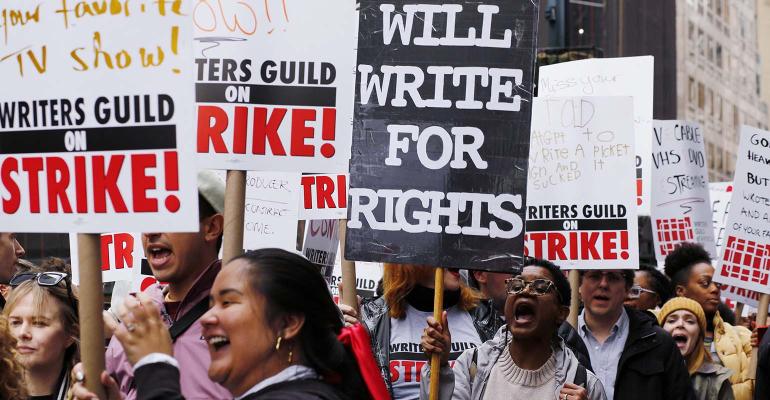The Writers Guild of America (WGA) went on strike on the morning of May 2.
Labor unrest is on the rise. The number of strikes in the United States rose almost 50% between 2021 and 2022, according to Cornell University’s School of Industrial and Labor Relations.
Beyond blue-collar workers, professionals have been wielding an increasing amount of leverage. A tentative contract agreement was reached in March between the Los Angeles Unified School District and its support staff after a citywide, three-day strike. A 2023 nurses’ strike in New York City also lasted three days, after which the strikers’ demands were largely met. A writers’ strike does not have the same ramifications as a walkout by transportation workers, teachers or nurses but it can impact an economy.
"Many don’t realize the long-range effects a strike can have not only on individuals and their families but on a community, even a city." says Jeff Fishman, whose LA-based firm JSF manages nearly $2 billion in client assets and guided numerous clients through the 100-plus-day 2007 writers’ strike. "When production slows, it impacts trades and crafts people, make-up artists, drivers and nearly everyone in between. Subsequently, less is spent in the local economy.
Though some strikes either don't come to pass or last only a short period, the financial pain often can begin long before the official work stoppage does and linger long after it’s over.
“In Hollywood the production slowdown actually started a few months ago and its effect can be seen all over the industry,” says Karen Malkoff-Hatton, a CFP in Tarzana, Calif. “A lot of crew members, stunt persons, costume designers, camera personnel, sound engineers, etc., weren't working even before the strike started.”
With work, and presumably most of their revenue, slowed or even stopped while lawyers haggle over the details of the two side's future relationship, what are potentially striking workers supposed to do financially in the short term?
Patrick Dinan of Impact Fiduciary in Glendale, Calif., recommends keeping an eye toward the future and not taking any chances. “Be proactive. If there’s a slowdown or recession on the horizon it’s a good time to revisit your budget with a sharp pencil. I regularly advise clients to keep three to six months of living expense on hand as a buffer and know where their money is going.”
Advisors can also play an important role in keeping clients calm and disciplined in such scenarios. “With a worker shortage and dual-income households, some may feel emboldened,” says Rochelle Odesser of Madison Planning Group in White Plains, N.Y. “A person’s retirement account is often their largest savings. Under certain circumstances it may be okay to tap into this, but I urge clients to maintain a savings account in case of emergency to better serve this purpose.”
The playbook is constantly shifting. Where one's home may have provided a tappable resource in the past, that's less and less often the case today. “Real estate has changed,” says Dinan. “Many are looking at less house for their money due to rate increases. Many homeowners with small to no mortgage are staying put.”
And, as always, basic measures still can make a difference. Encourage clients to stay in regular contact with their union, keep their credit in good order, consider part-time jobs and be mindful of credit card spending.
“Hollywood is home to millions of stories,” says Fishman. “We try to ensure a happy ending.”





